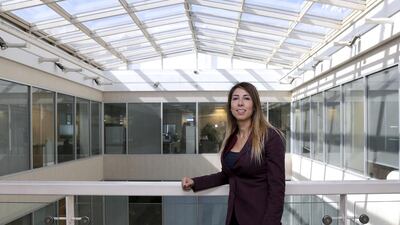Maysoun Ramadan knows that not every woman has been as lucky as her.
She works for a company committed to supporting women – and has made the most of every opportunity she has been given.
“I have got the chance to change countries, roles, responsibilities and have also been [promoted] to a leadership position. That is only because we have it as a culture in our company,” says Ms Ramadan, 33, who is now Roche Diagnostics’ communication manager for the Middle East.
“The company makes sure that the only reason it promotes someone is because of their competency, regardless of their gender,” adds Ms Ramadan, who is half-Jordanian, half- Turkish and has been living in Dubai for the past six years.
Yet Roche may be in the minority, because according to a study about gender parity in the UAE, not all women are afforded equal opportunities in the workplace.
Almost half, 44 per cent, of female respondents to the study for the Global Women in Leadership Economic Forum said women in the UAE are not given the same opportunities as men to become members of the board of public and private organisations, compared to just 14 per cent of men who agreed with the statement. By contrast almost two-thirds, 65 per cent, of men said women do have the same opportunities as them to sit on boards. Women, as it happens, might be right about this issue, because according to recent statistics from The Pearl Initiative, just 1.2 per cent of board members are female.
But board opportunities were not the only thing male and female respondents disagreed on. There was also a vast gulf between perceptions of women’s progress.
Almost half of women, at 43 per cent, said they had seen more women promoted or progressing in their organisation within the past year, compared to just 16 per cent of men.
“I was surprised by the difference of vision that men and women have on the situation,” says Sophie Le Ray, a co-founder of Naseba, which prepared the report, first published last November, in partnership with the UAE Ministry of Economy and in cooperation with EY.
“Obviously women face the issue of diversity on a daily basis and men don’t really even think about it. So they have a more positive outlook on it than we do.”
And it seems that positiveness also extends to pay. More than half, at 60 per cent, of male respondents said there was no gender pay gap in their organisation and only 7 per cent of men agreed that men are paid more than women. That compared to 29 per cent of women who said men earned more than women. Almost a quarter said men were not paid more than women and around half, 47 per cent, were not sure.
Rana Nawas, who is president of the Dubai chapter of global professional women’s network Ellevate, is in no doubt.
“What I have seen personally is there a huge gender pay gap and I think that’s a real issue,” says Ms Nawas, 36, who is senior vice-president of capital markets at GE Capital.
“I came across it is as president of the Ellevate Dubai. I have seen shocking statistics about females in the financial services industry about the lack of senior women in financial services. They come in at junior level and they stay there. There are very few women at the top and even women in middle management make a lot less than their peers. I am talking 30 per cent less.”
There are, however, a number of things that can be done to improve equality in the workplace, according to the experts. Ms Le Ray says increasing networking opportunities and introducing sponsorship and mentorship programmes would help.
Ms Nawas, who was born in the UK but moved to the UAE when she was five years old, is fully supportive of sponsorship. Every job she has got has been through a sponsorship of some kind. Networking is also a good idea, she says, pointing out that she was co-leader of the GE Women’s network for three years. But while mentorship can be valuable, it does not always work.
“I had one great mentor; she really helped, versus a guy I had as a mentor and was a disaster who made me almost think of quitting. The woman was always brutally honest. She never toed the company line. She made me feel that she genuinely had my interests at heart, whereas the guy toed the company line and behind my back wrote a note to my boss about [what we talked about],” says Ms Nawas.
“What I am saying is they can be very helpfu, but it is like a 50 per cent hit rate I would say; 50 per cent of the time it is completely useless.”
business@thenational.ae
Follow The National's Business section on Twitter


